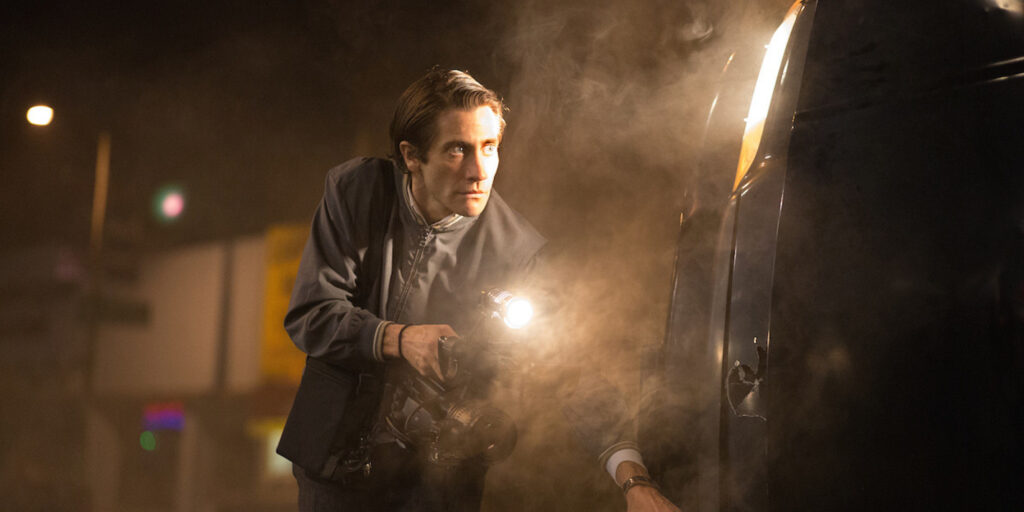Part of the fun — and the discomfort — of watching Nightcrawler is in gradually adapting to the rules of its nocturnal world, a sprawling network of photojournalism castaways following police reports to grisly crime scenes to shoot them and package the footage for network news stations. Because the film is locked to the perspective of Jake Gyllenhaal’s maniacally ladder-climbing Lou Bloom — meaning, with the exception of some interstitial pillow shots of the city, he’s in every scene and we only see what he’s privy to — the audience assumes his logic, and it’s not long before we’re thinking the way he thinks. How far away is any given reported crime scene? Is it worth a long trip at the possible expense of missing another golden opportunity? When footage is captured, is it the first of its kind, or the first from a specific angle? And how quickly can the content be migrated from, say, an Echo Park murder scene to a downtown TV station? Hypothetical considerations like these float urgently over Nightcrawler’s propulsive urban action, creating moment-to-moment suspense that’s difficult to ignore in favor of assessing, say, the implications of what’s happening. There’s a definite element of sport to this wayward profession, a notion confirmed when a rival videographer (Bill Paxton) enters the movie to stand in direct competition to Lou’s obsessive quest. And, as in sports, adrenaline kicks in under such oppositional pressure, a heightened inner fuel that exists independently of morality and ethics. It’s this feral high that director Dan Gilroy — whose debut feature this is — seeks to transfer to the audience through Nightcrawler’s story of professional one-upmanship; it’s also the high he’s trying to interrogate in a series of high-stakes third-act gut punches that locate the precise point at which audience thrill-seeking is fated to curdle into moral horror.
The eventual unraveling of the narrative plays cheaply into assumptions regarding the moral abyss of this world.
On the first point, Gilroy’s movie has its cards in the right places. As an awestruck account of an eerily fast learner in the art of opportunism, Nightcrawler is a hoot. Gyllenhaal plays Lou as a gangly go-getter with a preternatural knack for steering every conversation in his favor — be it through a bartering play to raise his wages or a cruelly wheeling-and-dealing bid to get inside the pants of his freelance boss (Rene Russo). When Lou hires his sidekick (a dead-on supporting performance by Riz Ahmed), the interview runs like the verbal version of an athletic scouting session, with the underling ruthlessly sized up for his quantifiable skill sets rather than his interpersonal traits. Lou’s way of treating everyone as pawns in his economic actualization scheme lends the film’s dialogue an acidic screwball quality, which Gilroy pairs with snappy shot-reverse-shot cutting and brisk walk-and-talk dolly shots. It’s because of this pace, which the film sustains for at least its first two acts, that it’s tempting to applaud Lou on his perversely logical tactics rather than scold him for his obvious dollar-sign eyes. After all, we live in a competitive economy and anyone — especially someone without a college-trained specialization — who can bend our fast world to his or her benefit deserves kudos.
All that could be characterized as Nightcrawler’s means; its end, meanwhile, is predicated on a higher level of thematic ambition that it isn’t adequately equipped to handle. Even if its milieu’s furnishings lean towards the atemporal (for instance, everyone uses some cryptic Microsoft ’95-esque editing software that, last time I checked, looks nothing like the handful of programs in existence), the film’s cynical representation of the news-cum-infotainment industry is not-so-mysteriously reflective of contemporary times, specifically with regards to the exponential escalation of sensationalistic story-building and the corresponding deterioration of journalistic standards. The eventual unraveling of the narrative plays cheaply into assumptions regarding the moral abyss of this world, twisting familiar and typically sentimental setups (most notably a scene of Lou kneeling over his sidekick’s dying body) towards malicious “gotcha” epiphanies. For all his eccentric nuances, Gilroy’s anti-hero — a sickeningly amoral punk without an empathetic bone in his body — is ultimately too neatly conceived as a machinelike byproduct of this American media rot. Nightcrawler is nothing if not committed in tracking its character into hell, but it’s a hell lamely aligned with a musty idea of network news as a mini-universe of decaying values.

